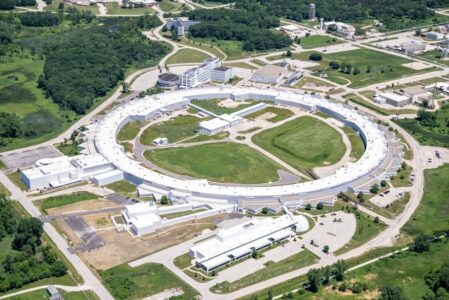ADVANCED PHOTON SOURCE (APS) UPGRADE IN PROGRESS;
APS USER EXPERIMENTS PAUSEDAPS is undergoing a comprehensive upgrade to replace its original electron storage ring with a new, state-of-the-art accelerator. This will increase the brightness of APS X-ray beams by up to 500 times, and new beamlines will be constructed to take advantage of these improved capabilities.
The upgraded APS will return to operation in Spring 2024, although initial operations will be at reduced current and availability as the machine is tuned up. Beamlines will come online at different points following the shutdown. Every APS beamline will undergo operational, technical, and scientific commissioning before restarting. Check the upgrade website for regular updates.
Argonne National Laboratory
 The Advanced Photon Source is a DOE Office of Science user facility at DOE’s Argonne National Laboratory sponsored by the Basic Energy Sciences program. APS provides ultra-bright, high-energy, storage-ring-generated X-ray beams for research in almost all scientific disciplines.
The Advanced Photon Source is a DOE Office of Science user facility at DOE’s Argonne National Laboratory sponsored by the Basic Energy Sciences program. APS provides ultra-bright, high-energy, storage-ring-generated X-ray beams for research in almost all scientific disciplines.
The APS underwent a year-long comprehensive upgrade in 2023-2024, with a newly constructed multi-bend achromat lattice electron storage ring that increases its X-ray beam brightness up to 500 times. Coupled with a significant increase in beam coherence, the upgraded APS will become a world-leading facility for high-energy X-ray science.
The upgraded APS, online in 2024, can probe samples at a spatial and temporal resolution previously unattainable with X-rays. It opens new avenues of discovery for materials, energy storage devices, microelectronics, physical and chemical sciences, geosciences, environmental and biological sciences, and medical and pharmaceutical sciences.
The specific advantages of the upgraded APS X-ray source include:
- Increased brightness, enabling delivery of intense beams with dimensions of one micrometer or less, resulting in a 100-fold improvement in signal to noise.
- Increased brightness at high energy (especially for 12 keV to 40 keV energies) which can be exploited to reduce primary radiation damage.
- Low convergence X-ray beams essential to studying large macromolecular complexes at high resolution.
The expanded APS capabilities offer new opportunities such as tracking protein conformational changes in real time by simultaneously recording structural and kinetic data to understand correlations between molecular motions and chemistry in catalysis.
BER Resources at APS
Launched in 2024, eBERlight expands biological and environmental research at APS. The resource acts as an integrated platform optimized to fulfill the experimental needs of researchers conducting experiments within BER’s program mission. eBERlight provides exclusive access to APS’ world-leading X-ray science resources, along with comprehensive guidance and support for users dedicated to advancing BER research science.
Other APS Capabilities
eBERlight provides comprehensive support to ANL’s Advanced Protein Characterization Facility (APCF), state-of-the-art laboratories located at the APS and furnished with standard and specialized equipment for chemical and microbiological experiments. These include a microfluidics lab and a high throughput structural biology pipeline composed of highly integrated core-technology units for bioinformatics, robotic gene cloning, protein expression, purification, characterization, crystallization, and structure determination. The program also offers access to the cryolab for specimen preparations under cryogenic conditions, laboratories equipped to handle oxygen-sensitive environmental samples, and plant growth chambers.
